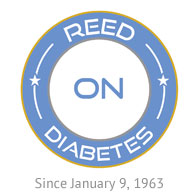My one sibling, Jennifer, is two years younger than me and was 18 months old when I was diagnosed. Growing up, we were a tight family and did things together. So it’s fair to say that she also lived with my diabetes.
This included observing my morning insulin injections, eating the recommended diabetes meals, listening to daily dialogue about my diabetes management, watching hypoglycemic episodes and the moods and abnormal behavior that went with them. Throughout our years growing up together, Jen didn’t ask many questions and didn’t judged my actions. And I sensed that she was supportive and with me the entire way.
After high school, we shared two years of college together at Kansas State University where Jen was more distant from me and my diabetes. We lived in separate places and studied in different buildings, but talked regularly. She would ask how things were going and I’d say ok. This was the late 1970s without blood meters and A1C tests. I really didn’t know.
As we entered adulthood, Jen married and started a family while I moved to Atlanta to pursue my career. Two decades later my family moved back to KC where diabetes became an increasing part of our relationship. Thanks to improved tools over several decades, I had been actively managing my diabetes and Jen noticed a difference. One evening she called and asked if I could come over and check on one of her sons, Alec. She said he had been going to the bathroom frequently. I asked if Alec had lost any weight recently and she said no. I drove to Jen’s house and talked briefly with Alec, Jen and her husband. I then pricked Alec’s finger and applied the blood sample onto a strip inserted into a blood meter. The display on the meter read, “HIGH.” I exhaled and they asked me what the number was. I explained what it meant. Alec was 14, packed for an overnight stay and headed to Children’s Mercy Hospital in Kansas City. So, my journey with Jen and diabetes got kick started with Alec’s diagnosis. (I’ll write more on Alec in a separate piece.)
Throughout my relationship with Jen, I am thankful for many things, but these stand out:
- She never judged me, my diabetes, or my management of it (and it ranged from laissez faire to tightly managed).
- She was attentive and there when she sensed something was wrong.
- She never complained about the impact diabetes had on her life. And it would have been easy … an older sibling getting most of the attention due to a persistent medical condition.
- She displayed empathy for others living with diabetes. She didn’t know what it was like to be in my shoes (or Alec’s) – but she certainly tried to understand and help.
Thanks, Jen, for being there throughout my life with diabetes … you’ve been there from the start. Love you!

